
ARCHAEOFAUNA
Scope & Guideline
Advancing Knowledge of Humanity's Animal Relationships
Introduction
Aims and Scopes
- Zooarchaeological Analysis:
The journal consistently publishes studies that analyze faunal remains from archaeological sites to understand species usage, dietary practices, and cultural significance of animal remains in different historical contexts. - Taphonomic Studies:
Research that examines the processes affecting animal remains post-deposition is a core focus, providing insights into preservation conditions, site formation processes, and the implications for interpreting archaeological data. - Biomolecular Applications:
The incorporation of biomolecular techniques, such as ancient DNA analysis, to investigate genetic relationships and species identification reflects the journal's commitment to advancing methodologies in the study of archaeological fauna. - Cultural and Ecological Contexts:
Papers explore the cultural implications of animal exploitation and the ecological relationships between humans and animals, contributing to a broader understanding of ancient economies and social structures. - Interdisciplinary Approaches:
The journal encourages collaborative research that combines archaeology, biology, and anthropology to produce comprehensive insights into human-animal interactions across various temporal and geographical scales.
Trending and Emerging
- Biomolecular and Genetic Analyses:
There is an increasing trend towards the application of biomolecular techniques, including ancient DNA studies, which are being used to uncover genetic relationships and species histories, thus enhancing the understanding of animal domestication and migration. - Interdisciplinary Research Frameworks:
A notable emergence of interdisciplinary research that integrates archaeology with ecological and anthropological perspectives is evident, demonstrating a holistic approach to understanding human-animal interactions and their implications for past societies. - Taphonomic Contextualization of Faunal Remains:
Recent works emphasize detailed taphonomic analysis to understand the formation processes of faunal assemblages, highlighting the importance of context in interpreting archaeological findings. - Focus on Environmental Impact and Sustainability:
A growing interest in examining the impacts of ancient human practices on ecosystems and the sustainability of resources reflects a contemporary concern that aligns archaeological research with current environmental issues. - Reassessment of Subsistence Strategies:
Emerging studies are increasingly focused on the reassessment of ancient subsistence strategies using new methodological approaches, such as cementochronology, to provide insights into livestock management and seasonal patterns.
Declining or Waning
- Traditional Taxonomic Studies:
There seems to be a decline in purely taxonomic studies that focus solely on species identification without broader contextual analysis, as the journal increasingly favors interdisciplinary and integrative approaches. - Regional Case Studies:
Earlier publications often emphasized localized case studies. However, there is a noticeable shift towards broader comparative analyses and themes that address wider geographical patterns and trends, indicating a potential waning of strictly regional studies. - Historical Documentation of Faunal Remains:
Papers focused on the historical documentation of faunal remains without strong analytical frameworks or new methodologies appear to be less frequent, as the journal prioritizes innovative research that utilizes advanced techniques.
Similar Journals

Boletin del Museo Chileno de Arte Precolombino
Exploring the Depths of Pre-Columbian HeritageBoletin del Museo Chileno de Arte Precolombino is a premier multidisciplinary journal published by the MUSEO CHILENO ARTE PRECOLOMBINO in Chile, dedicated to exploring the rich tapestry of pre-Columbian art and culture. With both ISSN 0716-1530 and E-ISSN 0718-6894, this Open Access journal has been providing free and immediate access to its scholarly content since 2016, making it a vital resource for researchers, professionals, and students alike. Covering diverse areas within anthropology, archaeology, and the visual arts, the journal consistently ranks in the Q1 category across multiple disciplines, illustrating its significance in fostering academic community dialogue and advances in understanding ancient cultures. As it converges from 2014 to 2024, the journal is poised to further enhance its impact, maintaining an esteemed position within Scopus rankings and reinforcing its commitment to high-quality research and scholarship in the humanities.
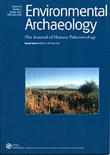
ENVIRONMENTAL ARCHAEOLOGY
Bridging Archaeology and Ecology for Sustainable InsightsENVIRONMENTAL ARCHAEOLOGY, published by ROUTLEDGE JOURNALS, TAYLOR & FRANCIS LTD, serves as a leading platform for innovative research at the intersection of archaeology and environmental science. With a commendable history dating back to 1981 and a notable convergence in scholarly discussion from 2002 to 2024, this journal holds an esteemed Q1 ranking in both Archeology and Archeology (arts and humanities), as well as a Q2 in Environmental Science as of 2023. Positioned in the United Kingdom, ENVIRONMENTAL ARCHAEOLOGY's ISSN 1461-4103 and E-ISSN 1749-6314 reflect its commitment to disseminating high-quality research that explores how past human interactions with the environment inform modern ecological challenges. With its robust Scopus standings, including a rank of #17/413 in Arts and Humanities and an impressive #15/354 in Social Sciences, the journal is recognized for its significant contribution to the field, making it an essential resource for researchers, professionals, and students eager to advance their understanding and application of environmental archaeology.

CONTRIBUTIONS TO ZOOLOGY
Pioneering Research in Ecology and EvolutionCONTRIBUTIONS TO ZOOLOGY, published by BRILL, is a premier scholarly journal dedicated to advancing the field of zoological sciences. With an ISSN of 1383-4517 and an E-ISSN of 1875-9866, this journal serves as a vital platform for researchers, professionals, and students seeking to share their findings and insights related to animal science, ecology, evolution, and systematics. Recognized for its high academic standards, it ranks in the top quartile (Q1) for Animal Science and Zoology, and Q2 for Ecology, Evolution, Behavior, and Systematics, reflecting its significance and influence in the scholarly community. The journal has been consistently published since 1994 and continues to contribute pivotal knowledge that informs and shapes contemporary zoological research. Researchers can access the journal through traditional subscription models, ensuring broad dissemination of its impactful articles and studies. Contributions to Zoology plays an essential role in fostering collaboration and discussion within the zoological community in the Netherlands and beyond.

ANIMAL BIOLOGY
Advancing Knowledge in Animal Science and EcologyANIMAL BIOLOGY is a distinguished journal published by BRILL, focusing on the dynamic fields of Animal Science and Zoology, as well as Ecology, Evolution, Behavior, and Systematics. With an ISSN of 1570-7555 and an E-ISSN of 1570-7563, this quarterly journal serves as a pivotal platform for researchers and professionals seeking to contribute to the understanding of animal biology across diverse ecological contexts. The journal is recognized with a 2023 Scopus ranking of #234 out of 490 in the Animal Science and Zoology category, placing it within the 52nd percentile, alongside a rank of #409 out of 721 in Ecology, marking a solid contribution to the field. Although it currently holds a Q3 quartile in both categories, its commitment to quality research and novel insights continues to bolster its significance within the academic community. The open access option coupled with its publication history from 2003 to 2024 ensures a wide dissemination of knowledge, drawing in a global audience of researchers, professionals, and students eager to explore the intricacies of animal biology. By promoting high-quality discussions and innovative studies, ANIMAL BIOLOGY plays an essential role in advancing the understanding of life sciences and the evolution of biodiversity.

INTERNATIONAL JOURNAL OF OSTEOARCHAEOLOGY
Pioneering Insights into Past SocietiesWelcome to the INTERNATIONAL JOURNAL OF OSTEOARCHAEOLOGY, an esteemed publication in the fields of anthropology and archaeological science, published by Wiley. Established in 1991, this journal has consistently provided a platform for groundbreaking research, with its scope encompassing the study of human remains in archaeological contexts. Boasting an impressive impact factor and ranking in the top quartile (Q1) for Anthropology and Archaeology, the journal stands at the forefront of academic discourse, particularly in the arts and humanities. With Scopus rankings placing it within the 88th percentile in Archeology and the 81st percentile in Anthropology, it serves as a vital resource for researchers, professionals, and students alike. Though currently not offering Open Access, the journal remains committed to disseminating high-quality research that contributes significantly to our understanding of past societies through the careful study of osteological remains. Explore our extensive archives and join a community of scholars dedicated to advancing knowledge in osteoarchaeology.
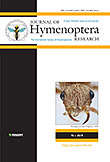
JOURNAL OF HYMENOPTERA RESEARCH
Leading the Charge in Hymenoptera ResearchJOURNAL OF HYMENOPTERA RESEARCH is a leading open-access publication dedicated to the advancement of knowledge in the fields of Insect Science, Animal Science and Zoology, and Ecology. Published by Pensoft Publishers since 2011, this journal plays a critical role in facilitating the exchange of significant research findings and insights related to Hymenoptera, a diverse order of insects that includes bees, wasps, and ants. With a commendable impact factor and ranked in the Q1 category for Insect Science and Animal Science, the journal stands out within the scientific community, drawing contributions from researchers globally. Boasting an ISSN of 1070-9428 and an E-ISSN of 1314-2607, the journal not only ensures broad accessibility to its content but also fosters a collaborative environment for professionals and students alike to engage with pioneering research. By reflecting on the converged years of 2007-2024, the JOURNAL OF HYMENOPTERA RESEARCH remains a vital resource for understanding the ecological and evolutionary dynamics of this important group of insects, solidifying its position as a cornerstone in entomological studies.
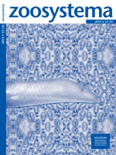
ZOOSYSTEMA
Advancing Biodiversity InsightsZOOSYSTEMA is a prestigious academic journal published by PUBLICATIONS SCIENTIFIQUES DU MUSEUM, PARIS, specializing in the fields of Animal Science, Zoology, and Ecology. With a focus on advancing the understanding of biodiversity and evolutionary processes, this journal serves as a vital platform for researchers to disseminate significant findings and foster discussions within the scientific community. Boasting an impressive categorization in the Q2 Quartile rankings for both its primary fields, ZOOSYSTEMA is recognized for its impact and quality, as indicated by its notable positions in the Scopus rankings. While currently not Open Access, the journal provides essential insights and comprehensive reviews across its volumes published since 1998, making it a cornerstone in zoological and ecological research. Researchers, professionals, and students alike will find ZOOSYSTEMA an invaluable resource for understanding complex biological systems and their interrelations, contributing to informed conservation and management efforts globally.
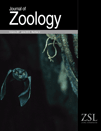
JOURNAL OF ZOOLOGY
Illuminating the intricate relationships of animal life.JOURNAL OF ZOOLOGY, published by Wiley, stands as a premier scholarly journal in the fields of Animal Science and Zoology, renowned for its outstanding contributions to the knowledge of animal biology and ecology. With an impressive impact factor and a strong ranking in the Q1 category for Animal Science and Zoology, as well as Q2 for Ecology, Evolution, Behavior, and Systematics, the journal rigorously engages with both foundational research and groundbreaking discoveries since its inception in 1830. Located in Hoboken, New Jersey, this journal is dedicated to fostering the academic community's understanding of zoological sciences, providing access to important research that shapes wildlife conservation efforts and ecological studies. Although the journal does not currently offer open access options, it continues to attract significant attention, as evidenced by its strong Scopus rankings in related categories. Researchers, professionals, and students will find invaluable resources in the JOURNAL OF ZOOLOGY to advance their understanding of animal life and the ecological challenges it faces today.
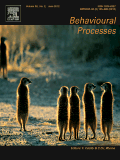
Behavioural Processes
Connecting disciplines to illuminate the pathways of behavior.Behavioural Processes, published by Elsevier, is a prominent academic journal that explores the intricate dynamics of behavior across various species, providing a multidisciplinary platform for researchers in the fields of Animal Science and Zoology, Behavioral Neuroscience, and Medicine. With a rich history dating back to 1976 and expected to continue until 2024, the journal has garnered recognition, achieving a Q2 ranking in Animal Science and Zoology and securing a significant position within Scopus rankings. Behavioural Processes serves as a vital resource for advancing our understanding of behavioral mechanisms, fostering innovation in both theoretical frameworks and practical applications. Although it is not an open access journal, its rigorous peer-review process ensures high-quality publishing, making it an essential tool for professionals, researchers, and students dedicated to uncovering the complexities of behavior. For further information, please visit the journal's webpage hosted by Elsevier in Amsterdam, Netherlands.
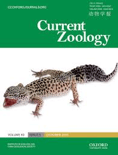
Current Zoology
Exploring the Wonders of Zoological ResearchCurrent Zoology, published by Oxford University Press, is a leading open-access journal dedicated to advancing the field of zoology and animal science since its establishment in 2009. With an impressive Q1 ranking in Animal Science and Zoology as of 2023, the journal maintains a prominent position within the academic community, supported by a ranking of #138 out of 490 in Scopus. Current Zoology serves as a vital platform for researchers, professionals, and students, showcasing high-quality research that spans a broad array of topics within the domain of zoology. This journal is characterized by its rigorous peer-review process, ensuring the dissemination of credible and impactful findings that contribute to the understanding of animal biology and conservation efforts. The open-access model enhances accessibility, allowing a wider audience to engage with the pivotal research being conducted in this dynamic field. Processing all manuscripts in an efficient manner and featuring articles that push the boundaries of current knowledge, Current Zoology is your gateway to explore innovative discoveries and trends in zoology.